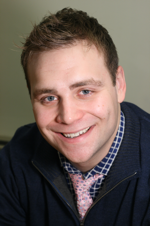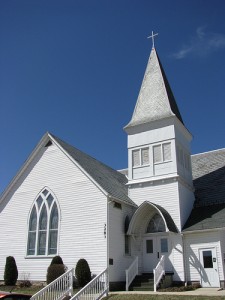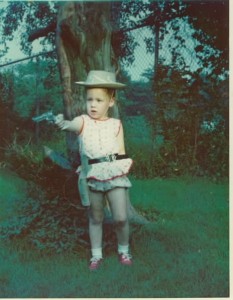Africa
If justice is only an implication, it can easily become optional and, especially in privileged churches, non-existent. In the New Testament, conversion happens in two movements: Repentance and following. Belief and obedience. Salvation and justice. Faith and discipleship.
Atonement-only theology and its churches are in most serious jeopardy of missing the vision of justice at the heart of the kingdom of God. The atonement-only gospel is simply too small, too narrow, too bifurcated, and ultimately too private.
The reason the word Evangelical has become so poisonous is because the answer to the above question comes from a conversion-based model of cultural engagement - political, theological and social. Too many Christians believe, and have wrongly been taught, that those "others" and "opposites" who have made an active choice not to believe in "our" teachings are justifiably: 1) left to their own devices as we wash our hands of them because of their bad choice (think in terms of blood-on-their-own-head); or 2) uninformed, so much so that their "no" is an illegitimate answer.
Evangelicals care more about positions -- whether progressive or conservative -- than people. We lack nuance. We have become either all Scripture or all Justice. I don't know where the balance was lost in terms of holding Scripture in high authority and, simultaneously, loving with reckless abandon?
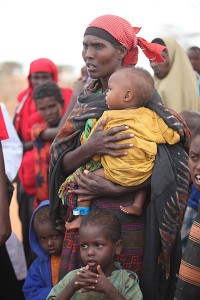
As Christians are we not obligated to help those who area most in need? Should we only focus on those in our own country who need our help, or does God's command us to ignore borders?
How might the words of the biblical prophet Isaiah resonate with us today, when he says: "If you spend yourselves on behalf of the hungry and satisfy the needs of the oppressed, then your light will rise in the darkness, and your night will become like the noonday."
The "sermon" consisted of reflections by five participants from different regions and traditions who were attending the Global Christian Forum for the first time. They each spoke of the joy, and often the surprise, in what they discovered here -- some of them interacting with delegates from Christian traditions they barely knew even existed.
The unity of heart and Spirit they experienced at the forum had a profound effect, they said. Emily Obwaka of Kenya, a staff member from the Association of Evangelicals in Africa, whom I met on the bus the first day of the forum, was one of those who shared. She said the forum felt like "a preamble to heaven." Such sentiments might seem excessive but they were not uncommon among the 287 forum participants from 65 countries. Joy and affirmation were among the greatest takeaways from the five-day gathering.
Adam Phillips is a Evangelical Covenant Church minister and director of faith mobilization for the ONE Campaign, www.one.org.
This video is the latest installment in an ongoing series at God's Politics where we've asked leading clergy, writers, scholars, artists, activists and others who self-identify as "evangelical" to answer the question, "What is an Evangelical?"
Ms. Maathai's life and work are examples of the truth of the adage, "Nothing is more powerful than a made up mind." She made up her mind that planting trees is a way to make life better for rural women and for all of humankind. She wanted to plant one tree for every person in Kenya. An the Green Belt Movement has planted tens of millions of trees.
What's more obscene? Thirty-thousand children dead in Somalia in three months? Or the world standing by and letting it happen?
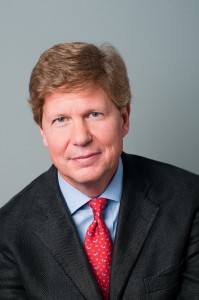 The puzzle here is not that readers of the Bible would tilt toward the political left. That, for me, as well as for thousands of other American evangelicals, is self-evident. Jesus, after all, summoned his followers to be peacemakers, to turn the other cheek, to welcome the stranger and to care for “the least of these.” He also expressed concern for the tiniest sparrow, a sentiment that should find some resonance in our environmental policies.
The puzzle here is not that readers of the Bible would tilt toward the political left. That, for me, as well as for thousands of other American evangelicals, is self-evident. Jesus, after all, summoned his followers to be peacemakers, to turn the other cheek, to welcome the stranger and to care for “the least of these.” He also expressed concern for the tiniest sparrow, a sentiment that should find some resonance in our environmental policies.
No, the real conundrum lies in the subtitle the editors of Christianity Today assigned to Franzen’s article, which was titled, “A Left-Leaning Text.” Adjacent to a picture of a Bible tilted about 45 degrees to the left, the editors added the subtitle: “Survey Surprise: Frequent Bible reading can turn you liberal (in some ways).”
The fact that anyone should register surprise that the Bible points toward the left should be the biggest surprise of all.
And I'll be your new tour guide here at God's Politics.
Some of you may know me by my more official byline, Cathleen Falsani. I've been a contributing editor and columnist for Sojourners Magazine for several years now, writing a column every other month called "Godstuff" and also have contributed from time to time to this'a'here blog.
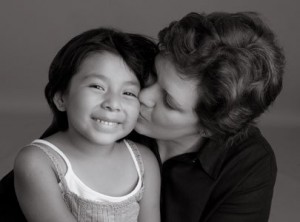 Could my mission really be confined to seeking the best for the children to whom I gave birth? Or, as a Christian, should I define "family" more broadly? I'd see images of women and children suffering around the world, and those puzzling verses returned to my mind. Maybe, instead of obsessing over the happiness of my babies, I should stick my head out of the window, so to speak, look around, and ask, "Who is my family?"
Could my mission really be confined to seeking the best for the children to whom I gave birth? Or, as a Christian, should I define "family" more broadly? I'd see images of women and children suffering around the world, and those puzzling verses returned to my mind. Maybe, instead of obsessing over the happiness of my babies, I should stick my head out of the window, so to speak, look around, and ask, "Who is my family?"
It didn't feel right to simply shrug my shoulders and blithely accept my good fortune as compared to that of people born into extreme poverty. I'd buy my kids their new school clothes and shoes and then think of mothers who did not have the resources to provide their children with even one meal a day. I'd wonder: what's the connection between us? Does the fact that $10 malaria nets in African countries save whole families have anything to do with my family buying a new flat-screen TV? Should it? Is there any connection between me, a suburban, middle class mom, and women around the world?
[Editors' note: Below is a hymn written by Carolyn Winfrey Gillette to inspire churches to further support and pray for famine relief in Somalia.]
O God, You Love the Needy
7.6.7.6 D LLANGLOFFAN ("Rejoice, Rejoice, Believers")O God, you love the needy and care for all the poor!
Today our hearts are heavy with news of drought and war.
When plantings yield no harvest, when hungry people die,
When families flee, defenseless -- Lord, hear your people's cry!
Broadcaster Tavis Smiley and Princeton professor Cornel West just wrapped up their 18-city "Poverty Tour." The aim of their trip, which traversed through Wisconsin, Detroit, Washington, D.C., and the Deep South was to "highlight the plight of the poor people of all races, colors, and creeds so they will not be forgotten, ignored, or rendered invisible." Although the trip has been met with a fair amount of criticism, the issue of poverty's invisibility in American media and politics is unmistakable. The community organizations working tirelessly to help America's poor deserve a great deal more attention than what is being given.
The main attack against the "Poverty Tour" is Smiley and West's criticism of Obama's weak efforts to tackle poverty. For me though, what I would have liked to see more is the collection of stories and experiences from the people West and Smiley met along their trip. The act of collective storytelling in and of itself can be an act of resistance.

